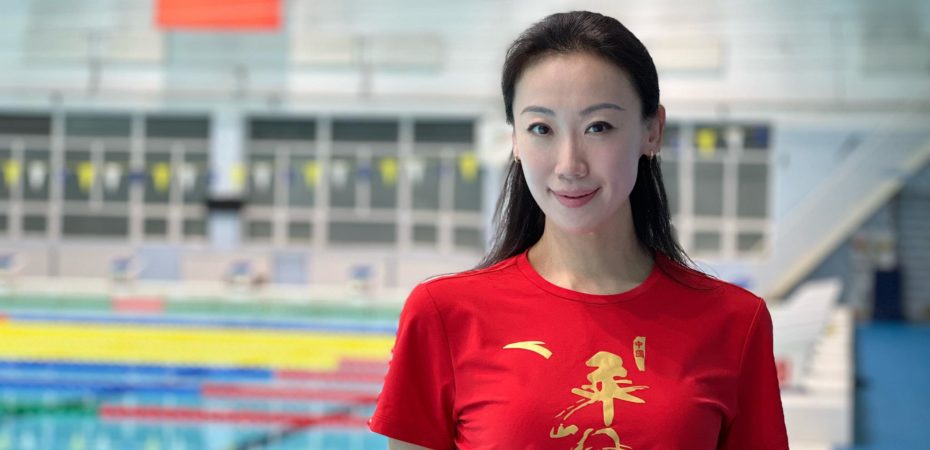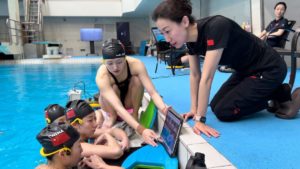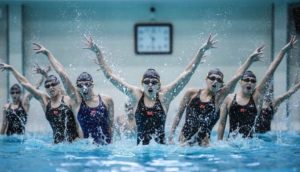On the podium of the World Championships in Rome back in 2009, Zhang Xiaohuan, captain of the Chinese synchronized swimming team, had a hard time holding back the tears. She knew full well everything it took and meant to be part of the first team to win World Championships medals for the People’s Republic of China in the sport.
The then-29-year-old, an always optimistic and steadfast team leader, couldn’t help but feel emotional at the moment, one that seemed the pinnacle of her career. After a historical Olympic bronze medal the year prior, the Chinese team had finally joined the ranks of the world’s top teams.
From her first World Championships in 1998 at the age of 17, to her third Olympic Games in 2008, followed by these World Championships, her sixth and last, she had seemingly seen it all. Standing on the podium in Rome, she knew she had helped pave the way for future generations of Chinese artistic swimmers, and recognized it was time for her to move on.

However, Zhang Xiaohuan, who also goes by “Christy” within the international artistic swimming community, didn’t stray too far from the pool. Fueled by an innate passion for the sport, she became a national coach essentially in the same breath as she announced her retirement as an athlete.
For the following 12 years later, she remained part of the national team coaching staff, before being named the head coach of China’s national team ahead of the 2022 season. During her first year in this role, the Chinese squad won four golds and two bronze at the World Championships. After earning five more medals in the 2023 World Championships, including three golds, the country secured its place to the 2024 Olympic Games by winning both duet and team events at the Asian Games.
Ahead of her first Olympics as a head coach, Zhang remains just as she was as an athlete: ambitious, whole-hearted, patient and passionate. Certainly, she aims high and dreams of leading her squad to the country’s first Olympic gold. But more importantly, she wants people to remember the Chinese artistic swimming team for all it can offer, whether it be in technique, artistic impression or choreography.
Inside Synchro: As an athlete, were you already thinking of a coaching career for the future?
Zhang Xiaohuan: Yes, I really wanted to keep my career in our sport because I love it. I have had a very strong passion for it ever since I started. I was around eight or so. When I was younger, it was really easy for me to get sick. I have allergic asthma, which led to many breathing problems. So, my parents sent me to a swimming club in Beijing, where we lived, to help with that.
One day, the synchronized swimming team coach came to the club to select some girls to create a new team. I am only the third generation in China for synchronized swimming. So at the time, I didn’t know what synchronized swimming was. But I knew I didn’t really like swimming, and I didn’t want to do that anymore. I was bored, and I was also so skinny so I was always cold. Lucky for me, I was selected, and I asked what synchronized swimming was. They said, “It’s just dancing in the water.” So I replied “Yes! Finally, no more speed swimming!” I was very happy.
I was skinny, flexible and a hard worker, so when I was around 13 or so, they gave me a chance to train with the national team and learn from the older girls. My first international competition came a few years later in 1995. I was 15 and I was selected for the World Junior Championships in Bonn, Germany. That was the start of it all… I have never left artistic swimming since.
IS: You have an impressive career spanning over 20 years and three Olympic cycles. What sis your most memorable moment as an athlete?
ZX: That would be the 2008 Olympic Games. Of course, it was the first time that China got a medal, but also it was in my hometown and we were the host country. We trained desperately, sometimes for more than 10 hours a day, fighting for this medal. I remember a very specific moment. Back then, I was the captain of the team. Before we came out on the Olympic stage, I gave the final speech. My teammates looked at me with a sincere and trusting gaze. Those eyes, I will never forget. The strength in unity empowers me. In that moment, I knew I would keep a foot in our sport, because I really enjoyed this specific time, to be the leader of the team, and to be the one who inspired others.
IS: You competed one more year after Beijing, and then immediately jumped into coaching. How was that transition from athlete to coach?
ZX: The World Championships in Rome were really the perfect ending of my sports career as an athlete. We got the silver medal in combo, and bronze in technical and free team. They were the first medals for China at the World Championships in artistic swimming. After I retired, I directly became a national coach for the London Olympic cycle.
One day, I am an athlete, the captain of the team, and the next, I am leading the national team coaching group to start my career, responsible for the key team events with my colleague former teammate Wang Na. I remember, it was national team selection, national training camp, and there were about 40 athletes there. I didn’t even know how to make a plan for the whole team! But our federation trusted me. At that time, I was really young, but I tried to quickly understand how to coach. I often felt unsure, sometimes I didn’t know what I should do. But I just followed my heart and trusted myself, because I’d been involved in synchro as an athlete for more than 20 years.
IS: You were named the head coach of China’s national team in late 2021. How has this new role been for you?
ZX: I will say, I am getting used to it. I also think this is my responsibility. After the Tokyo Olympic Games, all other national coaches either retired or chose to focus on their own clubs. But I am still choosing to chase my dream, so I stayed. It’s my pleasure, and I really love it.
IS: What is this dream you’re chasing?
ZX: Many coaches, if not all, want the gold medal. For me too, but on top of the gold, I wish one day that my choreography will wow everyone. That’s my dream. I want to create our own Chinese style, and for it to be remembered when people talk about the Chinese team. I want them to be able to recognize us immediately, to say, “This is China,” “This is Chinese culture.” And also while showing a different style from everyone else, yet one that will also inspire others.
IS: Can you tell me a bit more about the current Chinese team?
ZX: They are working so hard, I am so proud of them. 2023 was a difficult year, but we kept pushing. For example, this was the first year we did an acrobatic team routine at the World Championships. We invited the coaches of the Chinese diving team, who are the best in the world, to come help us with our acrobatics on land and in the water. During training, we took risks and tried many different things. Sometimes, we got injured. One of our girls broke her rib. She had to stay in bed for one month at the beginning of the season. But nobody gave up to show their potential to help, nobody feared or hid themselves from the team.
It’s really touching to me, because even though they might fear getting injured or hurt, they still want to show their talent, their abilities, their fight. They are always motivated for and by each other. Sometimes, I get emotional seeing them in such moments, always working as a team, learning from each other, analyzing together what can they improve on, always wanting to push hard for their goals and their country. Even sometimes, I say, “Okay, let’s stop, we give up.” But they always say, “No, we want to try again, trust us, we can do it, let’s go one more time.” It’s very inspiring to see.
IS: How did Team China adapt to the new rules this season?
ZX: We are always learning, always adapting. We have to constantly study and learn from our opponents through competition after competition, look for the direction of the new rules and new interpretations, and finally find the most suitable tactical arrangements for us.
It’s important to find the right balance. For the difficulty, we need to face the reality and see what our athletes can do. We don’t want to go above their abilities, but we know they have potential to go far. It’s all about building blocks. We know what they can do, so we have been going step by step. The goal is to accept the difficulty for each competition, make sure we finish all the moves, and get all the marks for the difficulty.
Honestly, it has been a big challenge and a learning experience. We have never worked like this before, making changes at the last minute. For example, the World Cup in Montpellier was our first competition under the new rules with the whole team. And only the day before the start of the competition, I changed two hybrids in the technical team. It has never happened before for Chinese athletes. So, it was a big challenge for all of us, they felt very nervous, but we took the risk. It was very emotional to see them all trusting me, the whole team, and to be brave enough to take that risk too.
At the World Championships in Fukuoka, we decisively decided to temporarily increase the difficulty in our acrobatic routine. The challenge seemed impossible, because the whole structure of our final lift had to change, going from six people supporting two people, to five people supporting three people. Everyone cooperated and brought their best efforts. I asked them to treat the final as a performance, to perform to their heart’s content and enjoy the process. To me, it was perfect!
But above all, I really want to improve the artistic impression for the Chinese team. I want all judges to love our routines. Actually, after the Budapest World Championships in 2022, I asked some of the judges what they expected of the Chinese team for the next competitions. They said, “to touch me,” “to inspire me,” “to make me feel I want to cry for you.” That gave me a lot of ideas for how to do the choreography. We know that we have good technique, so I really want to focus more on the artistic impression for our team.
Again, it’s about balance. We need to combine Asian culture, Chinese culture, and Western culture. My dream is to inspire the audience, the judges and all our friends. I wish that they will like our routines deeply from the heart, that they will remember them, that they will name them later…
IS: Anna Tarrés, renowned choreographer and head coach of Spain from 1997 to 2012, considerably collaborated with the Chinese team in 2023. What did she bring to you and the team?
ZX: Already in 2019, Anna worked as our choreographer and super advisor already at the Gwangju World Championships. This year, she was more present, helping more with the programs, the choreography, and the strategy. I really trust her. She’s always full of energy, of inspiration. She’s sharing her experience and vision with me, and also, she’s teaching me how to take risks.
I remember when I was a swimmer, I always admired her work. I always felt like she was a crazy genius for our sport with choreography and possibilities. So, I invited her to China. When she came to us, she really gave me a lot of ideas, guided me for choreography and gave a lot of advice to the athletes. She’s also very strong in helping all team members believe in themselves and in developing everybody’s potential in the team. I will say, we are lucky to have her, and I hope Anna will be a very important people for us, for the Chinese team on the road to Paris.
It is also about what I said earlier. All the routines from Anna, I still remember. I know many people do. People are still talking about the Sea routine from the 2012 Olympic Games with the gold suits. So I hope one day, people will also remember my choreographies and routines from China the same way. That’s my dream, to influence the next generation for this sport. I really believe it’s also our responsibility as the national team of China. To show that it’s not just about high difficulty. It’s about great technique and good execution, but it’s also about the artistic impression, a good performance, great choreography, and good transitions.
IS: How is artistic swimming perceived in China nowadays?
ZX: At the national level, artistic swimmers are professional athletes. We are getting great support from the country and our government. In Beijing, we have a national training center with a pool specifically for us, so we never have to worry about pool time or availability. We have everything we need there to train at our best.
In 2017, the Chinese team won gold for the first time at the World Championships. That was a big moment, but the World Championships in 2022 were historic because it was the first time the Chinese team got gold in the Olympic events. I really believe it inspired the whole country. Finally, Chinese athletes were standing on the top of the podium. And the ones who did, they experienced this feeling, so this will help them to work harder, to fight because they want to get the gold medal again, and to inspire the younger athletes.
The sport is so popular now in China. Just in Beijing for club competitions, we have more than 500 kids, more than 20 clubs involved. Those young kids love artistic swimming. And in the entire country, it’s like a rolling snowball. Every year, we see the total number of our athletes becoming bigger and bigger. When I was young, people always asked, “What is synchronized swimming?” And I would have to explain. Now, everybody knows what it is.

IS: Do you also see a positive change in terms of young boys starting the sport?
ZX: Yes, especially in recent years because male athletes can compete on the international stage. With them now in the teams, it’s getting even bigger. This season, Haoyu [Shi] swam in the acrobatic team routine. He’s the number one male athlete in China, so it was time for us to show up and to show a male athlete in the team for China. Before this year, he never swam in a team, only in mixed duet, so I wasn’t sure how he would adapt. But he reacted quickly to working with the girls, and I didn’t see any difference between him and them. He brought power to the whole team, and a special atmosphere when we do the performance.
So now in China, more young boys get involved in the sport. Their parents have changed their mind about the sport; they love sending their boys into the clubs. At the junior level, we also have implemented bonuses for clubs who have male athletes in their teams. This has encouraged many clubs to be more proactive, to invite boys and to really contribute to the effort of promoting the sport.
With the 2024 World Championships only a few weeks away and with the Paris Olympic Games on the horizon, the Chinese national team is in the thick of its usual winter training with a newfound intensity and motivation. At the end of November, trials were held for the Doha World Championships and for the first phase of team selection for the Paris Olympic Games, where the nation undoubtedly looks to make a deep impression and leave an indelible mark on everyone watching.
ARTICLE BY CHRISTINA MARMET
All photos courtesy of Zhang Xiaohuan.
If you’ve enjoyed our coverage, please consider donating to Inside Synchro! Any amount helps us run the site and travel costs to cover meets during the season.





